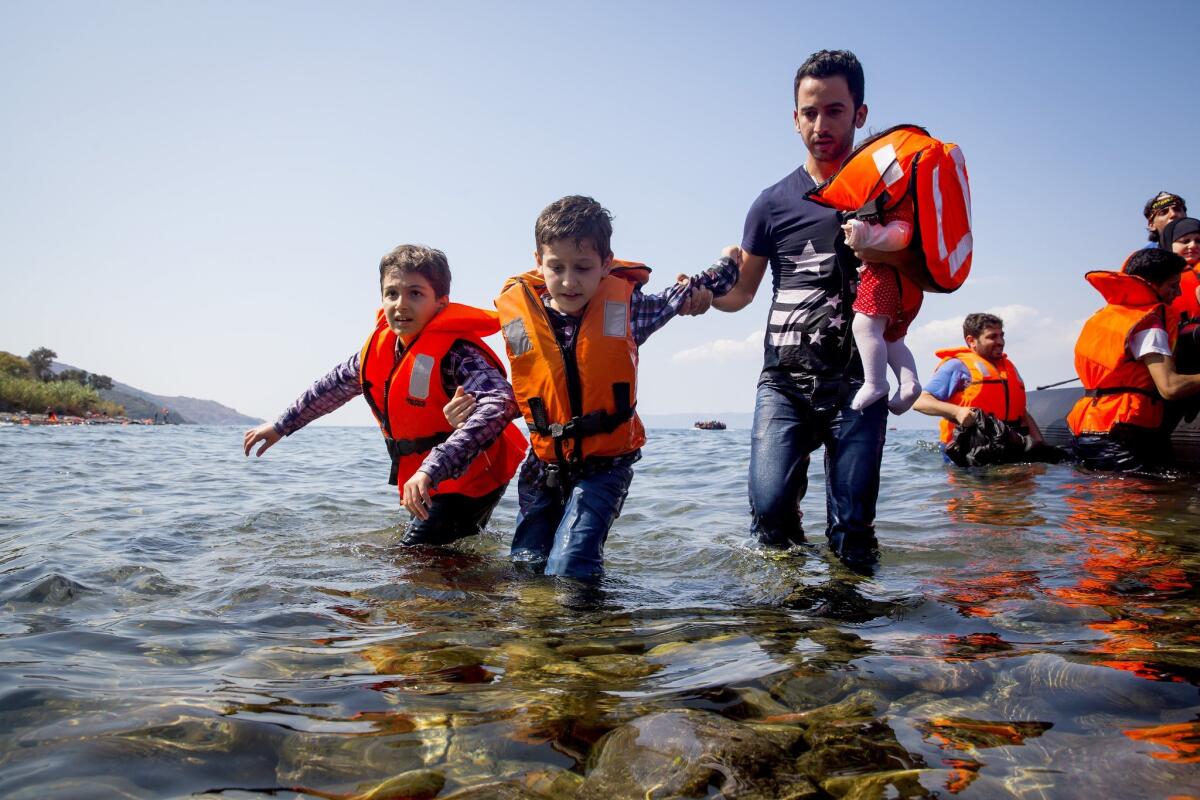Quotas for taking in refugees? European Union pressure mounts

Refugees come ashore Tuesday near the village of Skala Sikamineas on the island of Lesbos in Greece.
- Share via
Reporting from Berlin — Pressure on countries resistant to taking in refugees escalated Tuesday as leaders of welcoming nations called for mandatory quotas across the European Union and proposed fines on member states that refuse to comply.
Chancellor Angela Merkel of Germany, which is preparing to accept the lion’s share of the asylum seekers streaming into Europe by the thousands every day, said that the solution to the crisis would be “binding quotas” set according to each of the 28 EU nations’ size and economic capacity.
Merkel was seconded by Swedish Prime Minister Stefan Lofven, whose country has admitted even more refugees per capita than Germany. At a joint news conference, Lofven said it was morally incumbent on Europe to give sanctuary to legitimate asylum seekers.
“If people knock on the door who are fleeing from war, terror, rape, then we have to open the door,” he said.
A Franco-German proposal for distributing refugees across the EU is to be unveiled Wednesday. The Dutch government expressed its support for a quota system, and Austrian Chancellor Werner Faymann warned that recalcitrant countries could be fined for not joining in the common effort to resolving Europe’s biggest migrant crisis since World War II.
But there is no sign that nations such as Hungary and the Czech Republic, which oppose quotas, are likely to change their minds anytime soon.
“Unfortunately, we are still far away” from an agreement, Merkel acknowledged.
The pile-on of diplomatic pressure added to growing popular pressure in some European nations to take in more refugees, particularly Syrians, who make up the largest group of people seeking asylum.
Public sentiment was galvanized by heart-wrenching photos of a Syrian toddler who drowned last week off the Turkish coast, along with his brother and mother, in the family’s desperate attempt to reach Europe.
Spain, which had previously agreed to receive fewer than 3,000 refugees, said Tuesday that it would abide by the quota imposed by the EU. Madrid’s pledge came a day after France and Britain said they would increase their intake of refugees — to 24,000 and 20,000, respectively — over the next few years.
Poland also said Tuesday that it could receive more than the 2,000 people it has so far agreed to admit as long as the newcomers were genuine refugees fleeing for their lives and not simply migrants in search of better economic opportunities.
Germany, however, remains far and away the most open to asylum seekers. In addition to preparing to admit 800,000 this year — four times more than in 2014 and more than twice what was forecast at the start of 2015 — Germany could take in half a million refugees annually over the next few years, Vice Chancellor Sigmar Gabriel told German television Monday night.
“I have no doubt about it,” Gabriel said. “Maybe even more.”
Although such generosity has been lauded by human-rights organizations, some of Germany’s neighbors complain that Berlin’s open-door policy has worsened the crisis by enticing more migrants to come to Europe.
The surge continued along Europe’s southeastern flank, where tens of thousands of refugees and migrants have landed in Greece and then traversed the Balkans on their way to Northern Europe.
UNICEF reported Tuesday that nearly 10,000 people, about 40% of them women and children, crossed the border from Greece to Macedonia last week. From Macedonia, most asylum seekers push on through Serbia and Hungary en route to more hospitable and prosperous countries, such as Germany and Austria.
The Hungarian government is erecting a fence along its nearly 110-mile border with Serbia. Just inside the border, migrants scuffled with Hungarian police trying to keep them from pressing northward, but the situation calmed down when authorities began busing some of the migrants to a nearby processing center to be registered as asylum seekers, the Associated Press reported.
Antonio Guterres, the U.N. High Commissioner for Refugees, said the EU’s divided and “extremely dysfunctional” response to the migrant surge had made a bad situation worse.
“If Europe would be properly organized, it would be a manageable crisis,” Guterres said in Paris. “We’re talking about 4,000 or 5,000 people per day in a union that has 508 million people.”
Beyond Europe, the United States and Persian Gulf states came in for criticism by the United Nations on Tuesday for not resettling more Syrian refugees. Though some have given large sums of money in humanitarian aid, that was “not enough,” a senior U.N. official said.
“Taking refugees is separate from giving money,” Peter Sutherland, U.N. Secretary-General Ban Ki-moon’s special representative on migration, told reporters in Geneva.
Follow @HenryHChu on Twitter for news out of Europe
More to Read
Sign up for Essential California
The most important California stories and recommendations in your inbox every morning.
You may occasionally receive promotional content from the Los Angeles Times.














